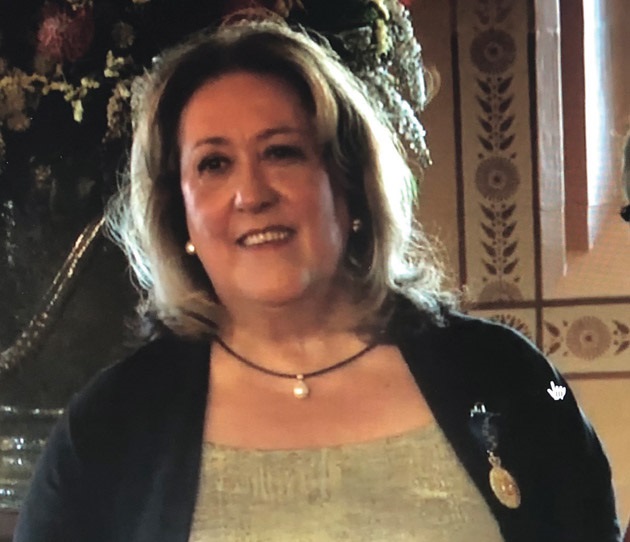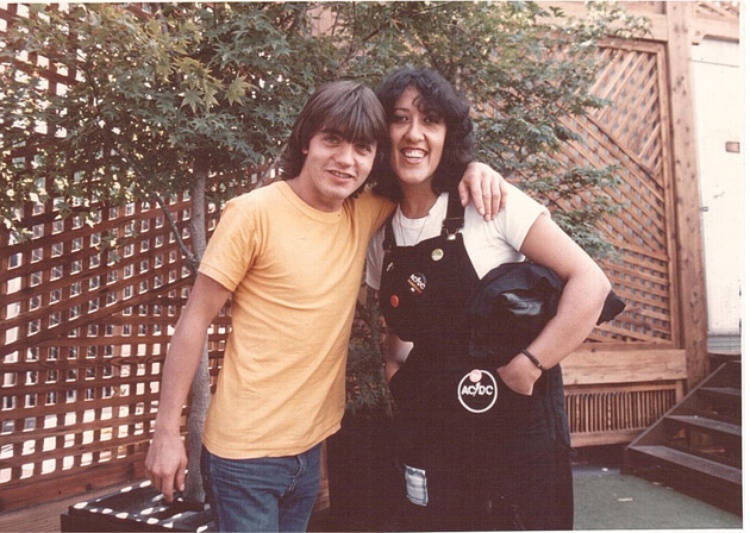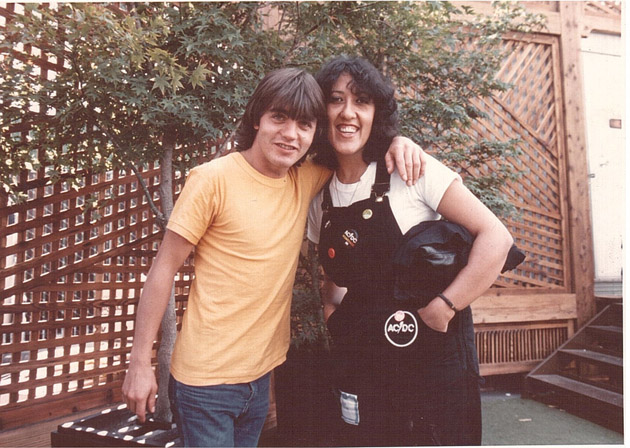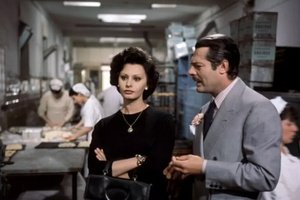The teen rushed to the pool for a close encounter with the athlete, who was a cult figure in Australia during the 1960s, celebrated for her sporting prowess and fighting spirit.
That same day, Fifa’s mother noticed a job advertisement in the newspaper and got in touch with her daughter.
“She told me to introduce myself and go to the interview,” the former CEO of music publishing and recording company Albert Music recounts.
“I didn’t want to initially ... I had just finished a year of business college and I wanted to have a couple of weeks off.”
What happened next showed how the banal hesitation of a 15-year-old during the summer holidays evolved into a highly successful career.
Riccobono took her mother’s advice and went to a job interview at Albert Music.
Little did she know at the time, she’d go on to work for the company for 40 years – starting out as a secretary and working her way up the ranks to become the first Australian woman to run a music company.
In 2019, Riccobono was appointed a Member of the Order of Australia (AM) for significant service to the music industry, while her career is showcased in the permanent exhibition ‘The Australian Music Vault’, displayed at the Arts Centre Melbourne and currently available online.

Fifa Riccobono on the day she was appointed a Member of the Order of Australia (AM) for significant service to the music industry. (Photo supplied)
Fifa, short for Crocifissa, was four years old when she migrated from the Sicilian town of Balestrate with her parents.
The family settled in Sydney, living first in Leichhardt and then moving to Mascot, where they bought a grocery store.
“I remember my first days of school,” Riccobono says.
“I didn’t have any friends because I didn’t speak a word of English.
“Then a nun took me under her wing and taught me to speak English.
“I was with her for about a year and a half ... by the time I’d finished with her, I could speak English and say my alphabet.
“She set me up really well for the rest of my schooling.”
Nobody in Australia could pronounce the name Crocifissa, so from the age of five, she became Fifa, or Fifetta.
“I love my name; it’s never been a problem for me,” she says.
“Crocifissa reminds me of my nonna and Fifa is a name that nobody forgets ... other than me, there’s only the Federation of International Footballers Association!”
Riccobono’s first role at Albert Music was as a secretary to the professional manager, who transcribed the music and did the orchestrations.
“I remember that his job seemed like a dream,” she says.
“He got paid to play music! And he was a wonderful pianist.
“I felt very privileged because my father passed on his love of music to me.
“Never will you come across anyone who was as passionate about music as my father.
“His favourite was opera, but he loved Dean Martin, Perry Como, Frank Sinatra and Pat Boone ... all of the beautiful old American crooners.
“He died when he was 50 ... my mum was never a big music lover, but when my father passed away she began playing music every day to make her feel close to him.”
Riccobono had been working at Albert Music for four years when her family planned a trip to Italy.
“My mother hadn’t been back since we came out to Australia in 1955 and my parents wanted me to see my relatives,” she recounts.
“But we’d be away for four to six months and I didn’t know what to do with work.”
But Riccobono had already made an impression on her boss, Ted Albert, and he gave her time off without pay and told her she’d have a job to come back to.
Upon her return to Australia, the company was entering a new phase of the production and promotion of records.
Albert Music was in its golden years, and the company was churning out one successful artist after the next, who played the compositions of the duo Harry Vanda & George Young (members of the legendary band The Easybeats, famous for their hits Friday on My Mind and Hello, How Are You).
Occasionally the latter’s two younger brothers, Angus and Malcolm Young, would come in to record songs – forming the first incarnation of one of Australia’s most famous bands.
“They had already formed AC/DC, but it was only with the arrival of Bon Scott in 1975 that the band really came together,” Riccobono says.
Her first impression of the band’s legendary frontman wasn’t great.
“I thought he was crass and terribly rough,” she recounts.
“Then the manager introduced me to him after a show and he was just charming, such a lovely man.
“Over the next five years we became very close and he was a very close friend of mine for quite a while.’’
Confirming how the image of a rock star is almost always just a facade for fans and the media, Riccobono tells of when she brought the band to meet her mother.
“She adored Bon Scott and the Young brothers,” she says.
“Malcolm Young always invited her to his New Year’s Eve party.
“One day my mother told me that she had read some negative comments on AC/DC, in which they were accused of being devil worshippers, but I reminded her that unlike the journalists, she knew them in person.”
That said, one cannot deny that Bon Scott refrained from living a rock star lifestyle, and the highest price he paid was his life, when he was found dead in his car in London due to “acute alcohol poisoning” at the age of 33.
“The Young brothers were terribly affected by his death,” Riccobono says.
“But Bon’s parents insisted they carried on the band, saying it’s what their son would’ve wanted.”
So, after many auditions, the Young brothers hired Brian Johnson and the band recorded ‘Back in Black’, one of the best-selling albums in music history.
“I can’t think of any band that has been even more successful with the loss of a leader,” Riccobono says.
“Each member played a fundamental role and the Young brothers had a clear vision of where they wanted to take their music.”
Meanwhile, Riccobono began to harbor uncertainties about her own future.
After 20 years of total dedication to her work, travelling around Australia and abroad to promote records, she realised she may have neglected herself.
“Ted Albert was very understanding,” she says.
“He said: ‘You’ve given me the best years of your life and I don’t want you to have any regrets’.
“I took two months off and then went back; as soon as the telephone rang, I knew I didn’t want to be there anymore.”
Riccobono stayed away from music for three years, working for a boat charter company, “where I didn’t take my work home”.
Then, on the day of her birthday, Ted Albert died.
“I felt it was a sign and I thought that it was time that I went back,” she says.
“They actually asked me to go back and take over the music company, which I did.
“I stayed there for nearly another 20 years.”
During that time, the music scene changed dramatically.
Nowadays, songs are just a click away – easy to get and then forget.
“Bands like AC/DC and The Angels didn’t just write singles, they wrote albums,” she says.
“They put so much thought into it and it was about the whole experience.
“Now people just listen to the same song over and over until they’re sick of it.”
Having been a member of the board of directors of the Australasian Performing Right Association (APRA), Riccobono has also experienced pirating within the industry.
“I can remember fighting with my cousin once the dinner table,” she says.
“He said that he’d just downloaded all these songs for free online.
“Fire was coming out of my eyes and I said: ‘Do you think the best way that you can thank an artist for giving you something that you really enjoy is by stealing it from them?’.”
A couple of years ago, Albert Music was sold to major record company BMG and Riccobono continues to collaborate as a consultant, in addition to working on independent projects.
For many years now, she has also been involved with the music-based charity Nordoff-Robbins Music Therapy.
“To think that people consider music unimportant is ridiculous,” she concludes.
“It’s vital to our lives.”












